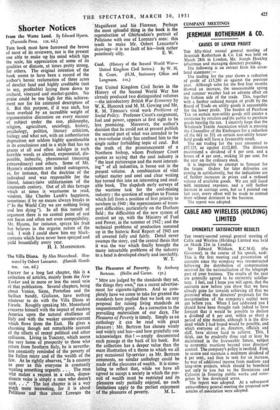Shorter Notices
From the Waste land. By Edward Hyams. (Turnstile Press. I 25. 6d.) Tins book must have furrowed the brows of most of its reviewers, nor is the present
one able to make up his mind which tips
the scale, his appreciation of some of its qualities or distaste, at times pretty strong, for others. The original intention of the book seems to have been a record of the author's heroic reclamation of three acres of derelict land and highly creditable (not to say, profitable) laying them down to orchard, vineyard and market-garden. No praise could be too high for this achieve- ment nor for his animated description of it. But this purpose, if it was such, has been overlaid by an incredible weight of argumentative discussion on every manner of subject under the sun, philosophy, religion, agriculture, sociology, history, psychology, politics, literary criticism, biology and what not, with an authoritarian dogmatism not seldom highly questionable in its conclusions and in a style that has no graces at all and often indulges in such horrible words as alerted, exponential, dis- ponible, imbecilic, phenomenal (meaning extraordinary) and others. Some of Mr. Hyams's statements are indeed outrageous, as, for instance, that the doctrine of the individual soul was responsible for the liberal, laissez-faire utilitarianism 'of the nineteenth century. Out of all this farrago which at times is wearisome to read, wisdom, like Charles Lamb's happiness, sometimes if by no means always breaks in (" In the World City we are nothing living and less dying "). In all this tumult of argument there is no central point of rest nor focus and often not even compatibility. Mr. Hyams, for instance, sprays his fruit but believes in the organic nature of the soil. I wish I could show him my black- currants which have never been sprayed and yield bountifully every year.
H. J. MASSINGHAM.






























 Previous page
Previous page